Fakhfakh Cabinet
The Fakhfakh Cabinet was the 30th government of the Tunisian Republic. It was formed by Elyes Fakhfakh on the appointment of President Kais Saied.[1]
Fakhfakh Cabinet | |
|---|---|
Cabinet of Tunisia | |
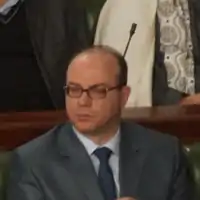 | |
| Date formed | 27 February 2020 |
| Date dissolved | 2 September 2020 (6 months and 6 days) |
| People and organisations | |
| Head of state | Kais Saied |
| Head of government | Elyes Fakhfakh |
| Total no. of members | 33 (incl. Prime Minister) |
| Member parties | Ennahda, Democratic Current, People’s Movement, Tahya Tounes, Tunisian Alternative, Nidaa Tounes, Ettakatol, Independent politicians External support: Machrouu Tounes, Afek Tounes, Aïch Tounsi, Republican People’s Union |
| Status in legislature | Coalition government |
| Opposition parties | Heart of Tunisia , Free Destourian Party , Dignity Coalition, Popular Front, Democratic and Social Union (VDS-PR-MDS), Farmers' Voice Party |
| History | |
| Election(s) | 2019 Tunisian parliamentary election |
| Legislature term(s) | II legislature (2019-2021) |
| Predecessor | Chahed Cabinet (2016–2020) |
| Successor | Mechichi Cabinet (2020–2021) |
History
Background and formation
The October 2019 general election resulted in a highly fractured parliament, with no party or list receiving more than 20 percent of the vote. No party or alliance obtained enough seats for a majority. Despite losing seats, Ennahdha became the largest party due to the fracturing of votes between other smaller, newer, or less established parties. According to article 89 of the Tunisian Constitution the President of the Republic shall within one week of the declaration of the definitive election results ask the candidate of the party or the electoral coalition which won the largest number of seats in the parliament to form a government, within a one month period, extendable once. On 15 November 2019 leader of Ennahda Rached Ghannouchi presented Habib Jemli for the post of prime minister when he met Kais Saied at the presidential palace [2] Jemli has been given one month, with the potential to renew for another month, to form a coalition government. Although Jemli was independent it was known he was very close to Ennahdha. He presented his list of ministers on 2 January 2020.[3] On 10 January 2020, he failed to gain the confidence of the Tunisian parliament.[4]
Cabinet members
| Office | Name | Party | Photo | |
|---|---|---|---|---|
| Head of Government | Elyes Fakhfakh | Ettakatol | 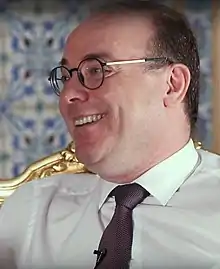 | |
| Minister of State, Minister attached to the Prime Minister in charge of Civil Service, Governance and the Fight against Corruption | Mohamed Abbou | Democratic Current | 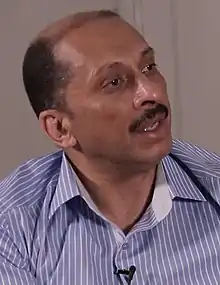 | |
| Minister of State, Minister of Transport and Logistics | Anouar Maârouf | Ennahda |  | |
| Minister of Interior | Hichem Mechichi | Independent | 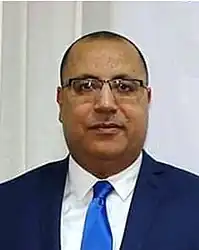 | |
| Minister of Defence | Imed Hazgui | Independent |  | |
| Minister of Justice | Thouraya Jeribi Khémiri | Independent |  | |
| Minister of Foreign Affairs | Noureddine Erray | Independent | .jpg.webp) | |
| Minister of Finance | Nizar Yaïche | Independent |  | |
| Minister of Religious Affairs | Ahmed Adhoum | Independent |  | |
| Minister of Social Affairs | Habib Kchaou | Independent |  | |
| Minister of Culture | Chiraz Latiri | Independent | 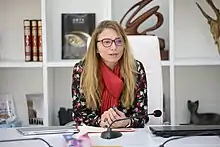 | |
| Minister of Women, Family, Children and Elderly and Government Spokesperson | Asma Shiri | Independent |  | |
| Minister of Industry | Salah Ben Youssef | Independent |  | |
| Minister of Energy, Mines and Energy Transition | Mongi Marzouk | Independent | 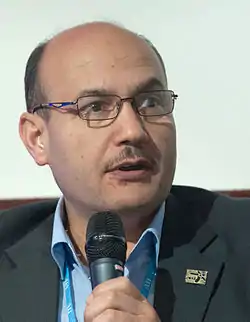 | |
| Minister of Agriculture, Fisheries and Water Resources | Oussama Kheriji | Independent |  | |
| Minister of Communication Technologies and Digital Transformation | Mohamed Fadhel Kraiem | Independent |  | |
| Minister of Higher Education, Scientific Research | Slim Choura | Ennahda |  | |
| Minister of Health | Abdellatif Mekki | Ennahda | 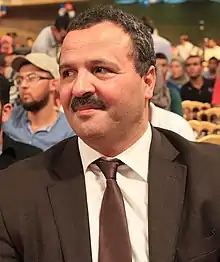 | |
| Minister of the Local Affairs | Lotfi Zitoun | Ennahda |  | |
| Minister of Youth and Sports | Ahmed Gaâloul | Ennahda |  | |
| Minister of Equipment, Housing and Regional Planning | Moncef Sliti | Ennahda |  | |
| Minister of State Domains and Land Affairs | Ghazi Chaouachi | Democratic Current | 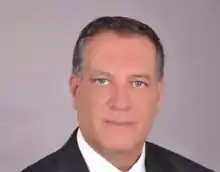 | |
| Minister of Education | Mohamed Hamdi | Democratic Current |  | |
| Minister of Employment and Vocational Training | Fethi Belhaj | People’s Movement |  | |
| Minister of Commerce | Mohamed Msilini | People’s Movement |  | |
| Minister of Development, Investment and International Cooperation | Selim Azzabi | Tahya Tounes |  | |
| Minister of Environment | Chokri Belhassen | Tahya Tounes |  | |
| Minister of Tourism and Handicrafts | Mohamed Ali Toumi | Tunisian Alternative |  | |
| Minister in charge of Relations with Parliament | Ali Hafsi Jeddi | Nidaa Tounes |  | |
| Minister responsible for major national projects | Lobna Jribi | Independent |  | |
| Minister in charge of Human Rights and Relations with constitutional bodies and civil society | Ayachi Hammami | Independent |  | |
| Secretary of State for Foreign Affairs | Selma Ennaifer | Independent |  | |
| Secretary of State for Water Resources | Akissa Bahri | Independent | 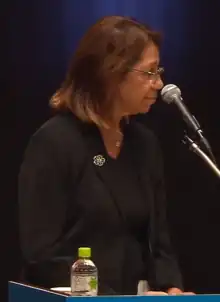 | |
References
- "رئيس الجمهورية يكلف الوزير الأسبق إلياس الفخفاخ بتشكيل الحكومة المقبلة". TAP. Archived from the original on 2020-01-21. Retrieved 2021-11-19.
- "Tunisia's president tasks Habib Jemli with forming new government".
- "Breaking International News & Views". Archived from the original on 2020-10-08.
- "Tunisian parliament rejects government, coalition building must restart". Reuters. 10 January 2020.